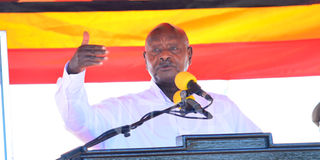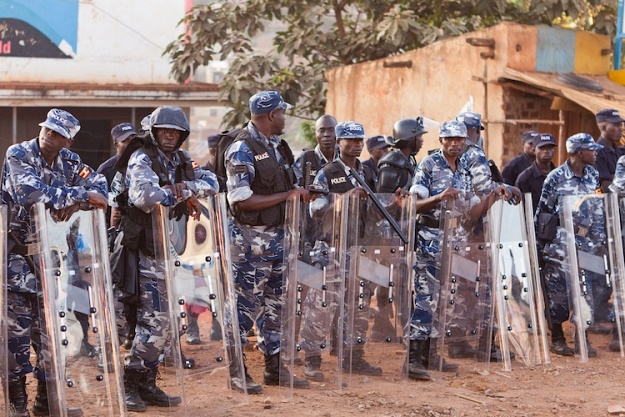Prime
If there’s no bread eat cassava - Museveni tells Ugandans

While addressing senior government officials, security operatives and workers’ representatives, among other Ugandans who gathered at Kololo ceremonial grounds to celebrate Labour Day, Mr Museveni said the skyrocketing prices were as a result of natural calamities like Covid-19 and exacerbated by man-made external factors like Russia’s invasion of Ukraine which have disrupted global supply chain and created scarcity of products. PHOTO/ FRANK BAGUMA
What you need to know:
- In a veiled swipe at critics of the controversial coffee deal which ministry of Finance signed with Uganda Vinci Coffee Company (UVCC), Mr Museveni appealed to Ugandans to stop using a language that depict lack of enthusiasm for foreign investments in the country.
President Museveni Sunday advised Ugandans to eat cassava as alternative to bread whose price has gone up due to disruptions in wheat supply, dashing hopes of many vulnerable citizens who were still counting on his government to initiate short-term interventions to cushion them against the skyrocketing prices of essential commodities.
While addressing senior government officials, security operatives and workers’ representatives, among other Ugandans who gathered at Kololo ceremonial grounds to celebrate Labour Day, Mr Museveni said the skyrocketing prices were as a result of natural calamities like Covid-19 and exacerbated by man-made external factors like Russia’s invasion of Ukraine which have disrupted the global supply chain and created scarcity of products.
“If there is no bread eat mwogo (cassava). Africans really confuse themselves. You’re complaining that there's no bread or wheat, please eat mwogo. I don’t eat bread myself,” Mr Museveni said.
The International Monetary Fund (IMF) mid this week warned that surging food and energy prices stoked by the war in Ukraine may lead to "social unrest" in Africa.
Most countries south of the Sahara are already seeing a slowdown in economic growth from last year, and the impact will be amplified by the rising cost of cereals and fuel, it said.
However, Mr Museveni says he’s not worried given that his government is not entirely doing nothing to save the situation.
"The issue of skyrocketing commodity prices like petrol, fertilizers, among other essential commodities, are man-made by our friends in Europe. We are trying to talk to them quietly. I’m not worried. We shall find solutions. We are quietly talking to Western Europe and Russia. We shall brief you (Ugandans) about what we are doing at the right time," he said.
He further reiterated that the Parish Development Model (PDM), an initiative by government to uplift nearly 40 percent of Ugandans still stuck in subsistence production to commercial production will help create jobs as well as boost household income.
"Before we (NRM) came to power, only the few educated were rich and benefiting from government programmes while most of our people were poor. But we said no! If you sensitize them properly they can get out of poverty. We don't want only the educated to benefit from government programmes. We want everyone to benefit from government programmes. The Parish Development Model should kick start us to have about 60 million workers," Mr Museveni said.
In a veiled swipe at critics of the controversial coffee deal which ministry of Finance signed with Uganda Vinci Coffee Company (UVCC), Mr Museveni appealed to Ugandans to stop using a language that depict lack of enthusiasm for foreign investments in the country.
“I want to advise Ugandans that you can encourage the indigenous investors if they are there but do not show lack of enthusiasm for our investors from outside. No one can beat me in Africanism, but I welcome all investors,” he said.
According to him, the coffee debate is “very interesting.”
“I am even glad that people are putting their views in writing. They are attacking the coffee deal that it is bad. We are going to study you now that you have put your thoughts in black and white,” he added.





